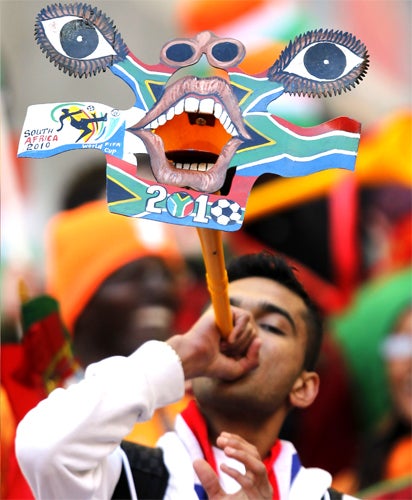Your support helps us to tell the story
From reproductive rights to climate change to Big Tech, The Independent is on the ground when the story is developing. Whether it's investigating the financials of Elon Musk's pro-Trump PAC or producing our latest documentary, 'The A Word', which shines a light on the American women fighting for reproductive rights, we know how important it is to parse out the facts from the messaging.
At such a critical moment in US history, we need reporters on the ground. Your donation allows us to keep sending journalists to speak to both sides of the story.
The Independent is trusted by Americans across the entire political spectrum. And unlike many other quality news outlets, we choose not to lock Americans out of our reporting and analysis with paywalls. We believe quality journalism should be available to everyone, paid for by those who can afford it.
Your support makes all the difference.When Spain paraded the European Championship trophy around Vienna's Ernst Happel Stadium, the massed ranks of their supporters began an acapella version of the White Stripes' "Seven Nation Army". Should they repeat the triumph at Soccer City, the only noise audible will be the blare of the vuvuzela, which has overtaken impala as the most famous Zulu word to have entered the English language. Not even Manuel Artesero, or "El Bombo", whose big bass drum has accompanied Spain for 30 years and has the title of the "conductor" of the Roja, will be heard. As for the English trumpet that chimes out the theme to "The Great Escape", it has been overtaken by a different horn.
The vuvuzela has dominated the 2010 tournament like no footballer thus far. Both Lionel Messi and Cristiano Ronaldo have complained that it is impossible to hear a word from the bench while the Denmark goalkeeper, Thomas Sorensen, said he could not organise his back four against the Netherlands. Given the Danes' defensive chaos in Johannesburg, it was a convenient excuse.
So, too, are the demands of altitude and the Jabulani match ball. South Africa can do nothing about its geography and the greatest of all World Cups, in 1970, was played against a backdrop of high altitude, pollution and midday kick-offs in suffocating heat to accommodate European television schedules.
For the BBC, whose remit is to bring the world to your living room, to offer its viewers the option of removing the sound of the vuvuzela from its broadcasts smacks of trying to sanitise the tournament. There is not much point in having a World Cup in Africa if you remove the sounds of the continent. The vuvuzela is as much a part of this World Cup as the rivers of ticker tape streaming down from the stands of the the Monumental stadium were of Argentina '78.
But the combination of thin air and the Jabulani has proved a problematic pairing even to teams who, such as Holland, trained for three weeks first in the Alps and then the highveld. At least their schedule will take them to the shores of the ocean at Durban and Cape Town. Denmark, who rank 222nd in a list of countries judged by their highest point above sea level, have been condemned to play all their matches at altitude.
"The ball comes quicker and it is harder to control than any we have seen before," reflected Sorensen. "Whoever deals with it best is likely to go all the way to the final."
The Jabulani is manufactured in Germany by Adidas; they have used it in the Bundesliga for six months and employed it to devastating effect against Australia. Vorsprung durch Technik once more.
The trouble with trumpets: Why top players detest vuvuzelas
Lionel Messi, Argentina
"It is impossible to communicate, it's like being deaf."
Cristiano Ronaldo, Portugal
"It is difficult for anyone on the pitch to concentrate. A lot of players don't like them, but they are going to have to get used to them."
Xabi Alonso, Spain
"I think they should be banned. They make it very difficult for the players to communicate. They are a distraction and do nothing for the atmosphere."
Patrice Evra, France
"We can't sleep at night because of the vuvuzelas. People start playing them from 6am. We can't hear one another out on the pitch because of them."
Tim Meyer, Germany team doctor
"You can think about ear plugs, but that would mean an even more serious communication problem on the pitch."
Thomas Sorensen, Denmark
"The problem is you just can't communicate. You really have to use eye contact. Whatever I say to the defenders will not be heard. You need things sorted out before the game, know where people are, use hands signs, because you have no chance on the field to do things quickly. When you play in England you are used to the good atmosphere and the people singing, but this is just a constant noise. It's obviously part of the tradition here, but I prefer people singing."

Join our commenting forum
Join thought-provoking conversations, follow other Independent readers and see their replies
Comments